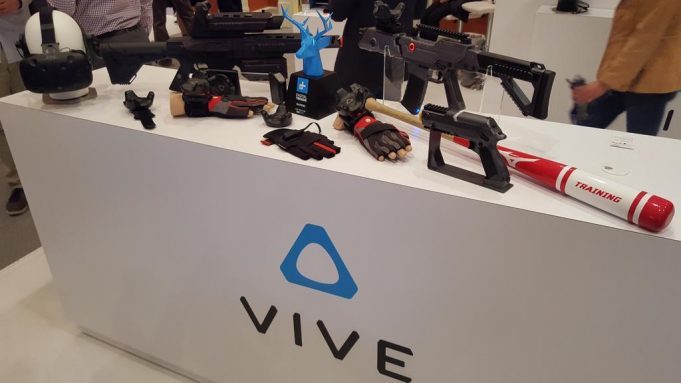 The most significant VR announcement from CES 2017 was the Vive Tracker, a modular Lighthouse-tracked ‘puck’ attachment that will enable users to track additional objects within VR experiences. It has the potential to drive a lot of new innovative applications and gameplay for consumers, to kickstart a lot more mixed reality livestreams, but also grow the overall VR ecosystem as there will be more high-end B2B applications, advertising campaigns, and VR arcade peripherals.
The most significant VR announcement from CES 2017 was the Vive Tracker, a modular Lighthouse-tracked ‘puck’ attachment that will enable users to track additional objects within VR experiences. It has the potential to drive a lot of new innovative applications and gameplay for consumers, to kickstart a lot more mixed reality livestreams, but also grow the overall VR ecosystem as there will be more high-end B2B applications, advertising campaigns, and VR arcade peripherals.
I had a chance to catch up with HTC’s Dan O’Brien, who is the Vive General Manager of America, Europe, Middle East, and Africa. We talked about HTC’s emphasis of growing the ecosystem in 2017 with this new Vive Tracker, and what type of applications he expects that it will enable. We also talk about some of the privacy implications of virtual reality, and more about HTC’s approach of minimizing, anonymizing, and protecting any private data that is collected. There are amazing new opportunities for application developers to learn more about individual consumers than ever before, but with that power comes a responsibility to be conscientious enough to not record and store more identifiable information than is necessary.
LISTEN TO THE VOICES OF VR PODCAST
O’Brien used to be the Global Director of Compliance and Consumer Privacy & Security for HTC, and so privacy is near and dear to his heart. He says that privacy has been an important priority for HTC from the beginning since they’ve had a privacy engineering team working to anonymize, minimize, and protect any customer information that’s captured.
O’Brien says that there’s three different layers of security including the operating system, the driver software that runs the VR hardware, and finally the application developers. There are privacy considerations at each layer, and it’s up to each application developer to decide what information to capture and keep from their users. Once eye tracking becomes an essential part of the higher-end VR systems, then the fidelity of available insights will be both vast and powerful. O’Brien says:
I sit in talks sometimes where I’m the one saying to the publishers, ‘Hey, you’re going to be able to have a one-for-one relationship with a consumer that you’ve never had before with VR. You’re going to be able to learn so much more about what they like, what they dislike, whether that ad worked, whether they were interested in that product. You’re going to be able to learn so much more about your consumer if you’re doing the right things. It’s no longer going to be about clickthroughs. You’re going to know if they actually looked at it, and picked it up and interacted with it.’ But on the flip side of that is ‘How much of that information should you be grabbing? And what should you be holding onto? Then once you hold it, and once you draw that information in, how well are you protecting it?’
Whether it’s the developer of applications, hardware, peripherals, or the operating system O’Brien says that “Some people take too much information. They really don’t need to have all of that.” He’s calling for VR hardware and software developers to be very conscientious about what information they’re collecting and how well it’s being protected, especially since the Federal Trade Commission has the power to fine companies, but also to stop companies from selling or importing their products.
He says that consumer privacy is a contract that fosters trust with consumers, and that it’s a relationship that is directly connected to their brand and whether or not consumers will recommend their product to others. But privacy is also about protecting sensitive consumer information from hostile hacks or a potentially overreaching government.
Throughout 2017, there will be more dialog between government regulators and virtual reality companies to explore the potentials and risks. Virtual reality has the potential to enable so many amazing new capabilities, but also a lot of new risks from collecting and protecting sensitive biometric data. O’Brien says, “It’s a balance because you don’t want regulation that stops innovation. You don’t want too many rules that stops just what’s getting started to really flourish into what it could be, what it should be, and even what it will be.” He says that there’s already a lot of existing consumer protections for mobile phones and gaming software that be built upon, and that it’s more of a strategy of incremental improvement rather that needing to building something entirely new.
HTC and others will continue to sit down with government regulators throughout 2017 to explain critical concepts, existing approaches to protecting information, as well as contextualizing software concepts like heat maps that have additional implications when they’re applied to virtual reality.
There have also been larger trends within the tech industry that have been moving towards surveillance-based business models that correlate all of your internet activity into a singular identity, and I’ll be continuing to explore some of the privacy implications of virtual reality in future interviews.
Here’s a promo video of one of the Vive Tracker applications by DotDotDash, and was presented at HTC’s demo area at CES:
Support Voices of VR
- Subscribe on iTunes
- Donate to the Voices of VR Podcast Patreon
Music: Fatality & Summer Trip







